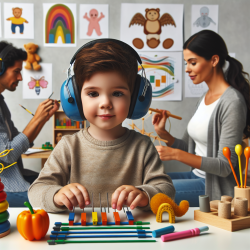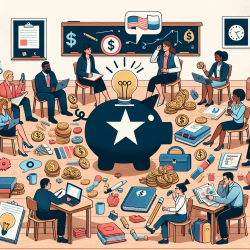Introduction
In the realm of speech-language pathology, the pursuit of enhancing children's literacy skills is paramount. The study titled "Generalization of Auditory Sensory and Cognitive Learning in Typically Developing Children" offers intriguing insights into how specific training can impact learning outcomes. This blog aims to distill the findings of this research to help practitioners improve their skills and encourage further exploration into the generalization of learning.
Understanding the Research
The study involved 60 typically developing children, aged 5 to 8, who were divided into five groups: attention, memory, auditory sensory, placebo, and a control group. Each group, except the control, underwent 12 weeks of training focused on their respective areas. The research aimed to assess whether training in auditory, memory, or attention could lead to improvements not only in the trained tasks but also in untrained tasks, particularly those related to phonological and reading skills.
Key Findings
Here are some of the critical outcomes from the study:
- On-Task Learning: All trained groups showed significant improvement in the tasks they were trained on, with older children generally learning faster.
- Mid-Transfer Learning: The memory group exhibited mid-transfer learning, particularly in the visual digit span task, suggesting that memory skills can transfer to untrained memory tasks.
- Far-Transfer Learning: Despite improvements in trained tasks, no significant far-transfer to phonological and reading skills was observed. This suggests that while specific cognitive skills can improve, they may not directly enhance language skills.
Implications for Practitioners
The findings highlight the importance of targeted training in enhancing specific cognitive skills. Practitioners can consider incorporating memory and attention training in their therapeutic approaches to foster cognitive development in children. However, the lack of far-transfer indicates that these interventions alone may not suffice for improving language skills. This underscores the need for comprehensive approaches that integrate various learning modalities.
Encouraging Further Research
The study opens avenues for further research into how different stimuli and extended training durations might influence the generalization of learning. Practitioners and researchers are encouraged to explore these variables to develop more effective interventions for language and literacy development.
Conclusion
While the study confirms the efficacy of cognitive training in improving specific skills, it also highlights the complexity of learning generalization. As practitioners, it is crucial to continue exploring innovative methods and integrating diverse training modalities to achieve holistic developmental outcomes for children.
To read the original research paper, please follow this link: Generalization of Auditory Sensory and Cognitive Learning in Typically Developing Children.










